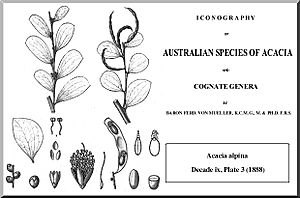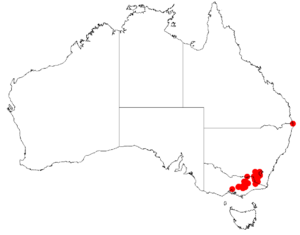Alpine wattle facts for kids
Quick facts for kids Alpine wattle |
|
|---|---|
 |
|
| Conservation status | |
| Scientific classification | |
| Genus: |
Acacia
|
| Species: |
alpina
|
 |
|
| Occurrence data from AVH | |
| Synonyms | |
|
Acacia longifolia var. alpina F.Muell. |
|
Acacia alpina (also known as the alpine wattle) is a type of evergreen shrub. This means it's a bush that stays green all year round! You can only find it in certain parts of southeastern Australia. It's special because it grows naturally only in that area.
What Does the Alpine Wattle Look Like?
The alpine wattle usually grows like a tangled bush. It can be about 1 to 2 meters (3 to 6 feet) tall. It can also spread out quite wide, up to 10 meters (33 feet) across! Its small branches have tiny, triangle-shaped leaves called stipules that fall off easily.
The main leaves of this plant are called phyllodes. They are evergreen, meaning they stay green all year. They often look like a rounded oval or almost circular shape. Sometimes, they are a bit uneven. These phyllodes are usually about 1.5 to 3.5 centimeters long and 8 to 25 millimeters wide.
When the alpine wattle flowers, it produces flower spikes. These spikes are shaped like a cylinder or an oblong. They are about 5 to 15 millimeters long. After the flowers bloom, the plant grows thin-walled seed pods. These pods look a bit like a string of beads. They can be curved or coiled and are usually 3 to 8 centimeters long and 3.5 to 6 millimeters wide. Inside these pods are narrow, oval-shaped seeds, each about 3.5 to 5 millimeters long.
Where Does the Alpine Wattle Grow?
The alpine wattle is found in different areas that are not connected. You can see it in the Snowy Mountains of New South Wales. It also grows in the southern parts of the Australian Capital Territory. Its range continues further south into the eastern Victorian highlands, around Mount Baw Baw.
This shrub likes to grow on hilltops, ranges, and plateaus. It is usually found at high altitudes, from about 1300 to 1800 meters (4265 to 5900 feet) above sea level. It often grows in rocky, windswept areas, especially where there is granite. Sometimes, it forms thick, dense groups of bushes. You can often find it in woodland and heathland areas.
The alpine wattle is closely related to another plant called Acacia phlebophylla. These two plants sometimes mix their genes, creating a new type of plant. You can often find A. alpina in the high mountain (alpine) and near-mountain (subalpine) regions of Australia.
The alpine wattle usually flowers from October to November. In gardening, people sometimes use it as a "ground cover" plant. This means it spreads out and covers the ground, which can help prevent weeds.
See also
 In Spanish: Acacia alpina para niños
In Spanish: Acacia alpina para niños


